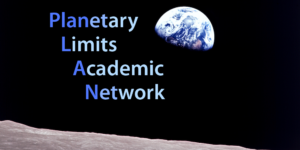Readers of this blog will know that I have come to some big-picture conclusions about success and failure that are unsettling. I don’t like them myself. Not only do they create an inner sadness about where I think the human endeavor is heading, but they result in a sort of isolation that I would rather not suffer—introvert though I am. Among other academics at my institution, it is rare for me to find kindred spirits, even among groups self-selected to care about environmental issues. Most don’t seem to see very far beyond climate change in the lineup of existential threats, increasingly focusing on inequities within the human population that stem from climate and environmental disturbances. I am glad that climate change awareness is high (a genuine threat), but even if climate change had never arisen, I think we would still be in grave trouble from the more fundamental flaws in our explosive approach to living on Earth.
This is a large part of the impetus behind PLAN, which I announced in the last post. Already, I am gratified that people joining the network from vastly different fields and experiences have formed similar conclusions at the highest level. So I’m not crazy, unless we all are. In any case, I am less lonely. [I will say that crazy is usually easy to spot in conversation: a little too insistent/enthusiastic/one-track. The PLAN folks feel really solid, broad, and even perhaps subdued to me: not the type you want to back away from at a party.]
But I still try to understand why so few of my colleagues have reached similar conclusions. The easy answer is that I’m just plain wrong. But believe me, I have tormented myself to try to discover the missing piece and go back to being a happy human bumping along in this race to who-knows-where. It’s not that my unconcerned colleagues have thought more deeply about the issues and can help a rookie out, in my experience.
In this post, I venture some guesses about the disconnect—some of which may even be on target. I will loosely frame the discussion in the context of academia, but much of the logic also applies beyond this scope. The basic idea is: complexity makes it hard to differentiate between real and artificial worlds.
Views: 8950


